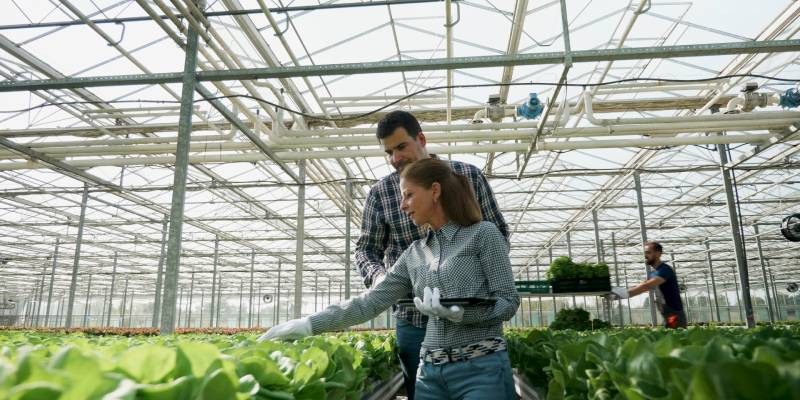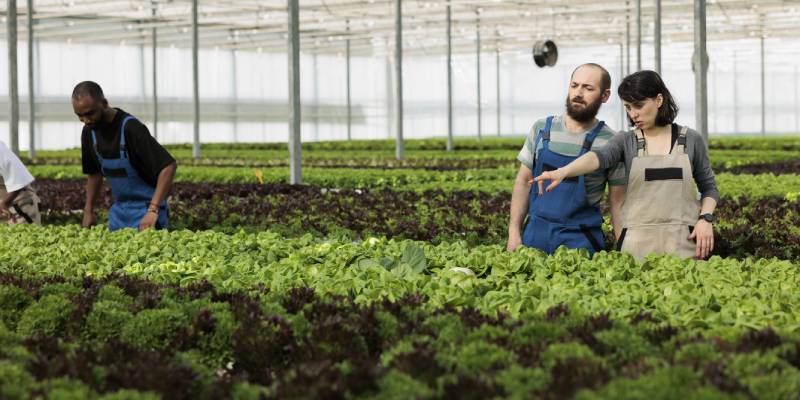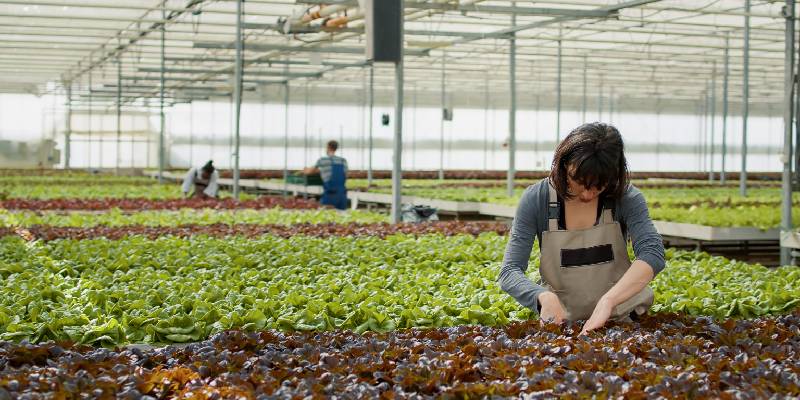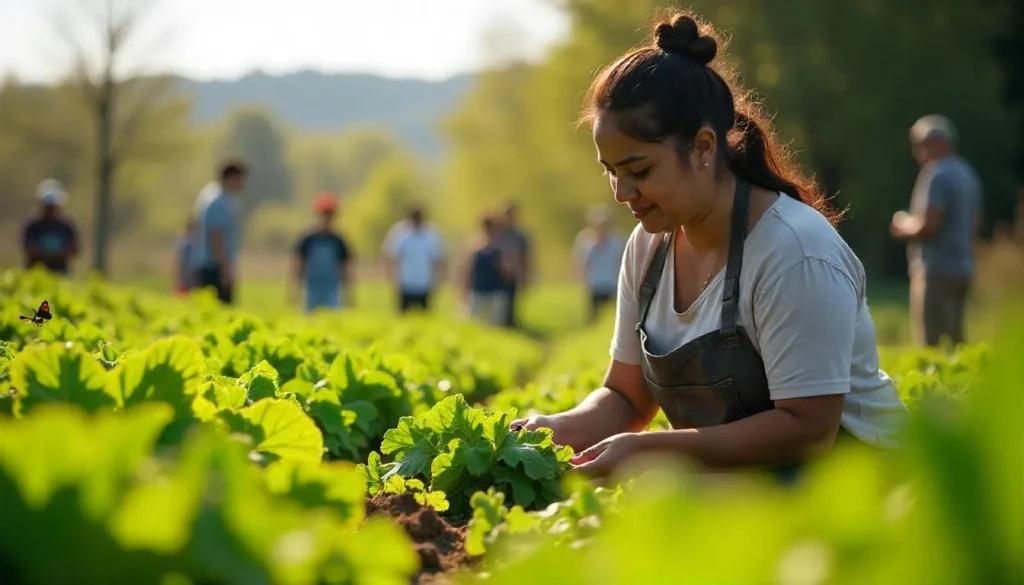Farming isn’t what it used to be, right? Gone are the days when farming meant just plowing fields and harvesting crops. Nowadays, farming is about precision, technology, and sustainability. Farmers are now at the forefront of the battle against climate change, using innovative strategies to ensure that agriculture remains productive without damaging our planet. This article explores the environment and sustainability, focusing on the top 10 key strategies that farmers can adopt to enhance environmental sustainability, with insights from Sanjeevani Farms.
What is Environment and Sustainable Development?
Environment and sustainable development are about creating a balance between human activities and nature. Sustainable development ensures that our farming practices meet the needs of the present without compromising the ability of future generations to meet their own needs. At Sanjeevani Farms managed farmlands, we focus on methods that nurture the land, conserve resources, and promote biodiversity, all while achieving optimal farm yields.
Environment Development and Sustainability Impact Factor
The impact of environmental development and sustainability on farm productivity is profound. By adopting eco-friendly techniques, we:
- Enhance Soil Health: Sustainable farming practices, such as crop rotation and organic fertilization, improve soil fertility and structure, leading to better crop yields.
- Conserve Water: Efficient irrigation systems and water-saving practices help conserve this vital resource while ensuring crops receive the moisture they need.
- Promote Biodiversity: By supporting a diverse range of plant and animal life, we create a resilient ecosystem that can better withstand pests and diseases.
Top 10 Key Strategies for Environment and Sustainability on Modern Farms

Let’s explore the Top 10 Key Strategies for Environment and Sustainability on Modern Farms:
Adopt Conservation Tillage Practices
Conservation tillage, such as no-till or reduced-till farming, minimizes soil disturbance. This practice helps prevent soil erosion, retains moisture, and improves soil health by increasing organic matter. By reducing the need for heavy machinery, conservation tillage also lowers fuel consumption and greenhouse gas emissions.
Benefits:
- Improved soil structure and fertility
- Reduced erosion and runoff
- Lower carbon footprint
Implement Crop Rotation
Crop rotation involves growing different types of crops in the same area in sequenced seasons. This practice can break pest and disease cycles, improve soil fertility, and reduce the need for chemical fertilizers.
Benefits:
- Enhanced soil nutrients and reduced soil depletion
- Improved crop yields and biodiversity
- Decreased reliance on chemical inputs
Utilize Cover Crops

Planting cover crops, such as clover or rye, during the off-season protects the soil from erosion and suppresses weeds. Cover crops also enhance soil organic matter and can fix nitrogen levels naturally, reducing the need for synthetic fertilizers.
Benefits:
- Reduced erosion and improved soil health
- Natural weed control and pest management
- Enhanced nitrogen fixation
Practice Integrated Pest Management (IPM)
Integrated Pest Management is a holistic approach that combines biological, cultural, and mechanical practices to manage pests. IPM reduces the need for chemical pesticides, which can harm beneficial insects and lead to pesticide resistance.
Benefits:
- Decreased chemical usage and environmental impact
- Improved pest control and crop health
- Promotion of biodiversity and ecosystem balance
Conserve Water Through Efficient Irrigation
Water conservation is crucial in sustainable farming. Techniques such as drip irrigation, rainwater harvesting, and soil moisture monitoring can help optimize water use, reduce waste, and lower costs.
Benefits:
- Reduced water consumption and costs
- Improved crop water efficiency
- Prevention of waterlogging and soil erosion
Promote Agroforestry Practices
Agroforestry integrates trees and shrubs into crop and livestock systems. This practice enhances biodiversity, improves soil structure, and provides additional income streams through timber and fruit production.
Benefits:
- Increased biodiversity and habitat creation
- Improved soil quality and carbon sequestration
- Diversified farm income sources
Implement Precision Agriculture Technologies
Precision agriculture uses technology, such as GPS and remote sensing, to optimize field-level management. By analyzing data, farmers can make informed decisions about planting, watering, and harvesting, increasing efficiency and reducing waste.
Benefits:
- Enhanced resource use efficiency
- Increased crop yields and quality
- Lower environmental impact
Enhance Soil Health with Organic Amendments
Adding organic matter, such as compost or manure, to soil can improve its structure, nutrient content, and water retention capacity. Healthy soil is vital for sustainable farming and long-term productivity.
Benefits:
- Improved soil fertility and crop resilience
- Enhanced water retention and erosion control
- Reduced need for synthetic fertilizers
Support Biodiversity with Habitat Restoration
Creating habitats for wildlife, such as hedgerows or wetlands, can support biodiversity and ecosystem services. These habitats attract pollinators, improve pest control, and enhance landscape aesthetics.
Benefits:
- Increased pollination and natural pest control
- Enhanced ecosystem services and biodiversity
- Improved farm landscape and aesthetics
Engage in Community-Supported Agriculture (CSA)
Community-supported agriculture fosters a direct connection between farmers and consumers. By selling directly to the local community, farmers can reduce transportation emissions, promote local economies, and encourage sustainable consumption.
Benefits:
- Reduced carbon footprint and emissions
- Strengthened local economy and community ties
- Encouraged sustainable and local food consumption
Discover Sanjeevani Farms: Pioneering Sustainability in Agriculture
At Sanjeevani Farms managed farmlands, sustainability is our daily practice and guiding principle. We blend modern techniques with traditional wisdom to farm in a way that’s both environment friendly and productive. Our commitment is to care for the land and use resources wisely for high-quality crop production.
Here’s how we lead in eco-friendly farming:
- Soil Health: Minimal tillage and natural fertilizers.
- Water Efficiency: Advanced irrigation and rainwater use.
- Pest Control: Natural pest management.
- Biodiversity: Planting trees and creating wildlife habitats.
- Precision Farming: Technology for exact resource use.
- Local Food: CSA programs reduce transport emissions.
- Crop Rotation: Maintains soil health and cuts synthetic fertilizers.
- Organic Practices: Focus on organic methods.
- Habitat Restoration: Enhances natural wildlife areas.
- Education: Workshops and tours on sustainable practices.
Conclusion
By using these key strategies, farmers can greatly enhance environmental sustainability and build a stronger agricultural system. Sustainable farming benefits both the planet and farm profitability, securing resources for future generations.
Sanjeevani Farms is at the forefront of this movement, showing how managed farmland thrives with agroforestry and innovative methods. Ready to transform your farming? Contact us today to see how Sanjeevani Farm can help you succeed sustainably.
FAQs
How can we conserve natural resources and sustain our environment?
Conserve natural resources by reducing waste, using resources efficiently, and adopting renewable energy. At Sanjeevani Farm, we use efficient water management, organic farming methods, and energy-saving technologies to minimize our environmental impact while enhancing productivity and sustainability.
How do the dynamics of machinery relate to environment and sustainability?
Modern machinery impacts environment and sustainability by reducing fuel consumption, minimizing soil disturbance, and lowering emissions. At Sanjeevani Farm, we use advanced equipment that supports precision farming, ensuring efficiency while adhering to our commitment to sustainable and eco-friendly practices.
What is a smart building and a smart and sustainable built environment?
A smart building uses technology to enhance energy efficiency and water conservation. A smart and sustainable built environment focuses on reducing environmental impact through innovative designs and materials. At Sanjeevani Farm, we integrate these principles to support our sustainable farming practices.
What are the benefits of smart buildings and a smart and sustainable built environment in agriculture?
Smart buildings and sustainable environments enhance resource and energy management. In agriculture, this means better efficiency and reduced environmental impact. At Sanjeevani Farm, we incorporate these principles to improve farm efficiency and lessen our ecological footprint.
What is sustainability in global and local environments?
Sustainability involves using resources responsibly and protecting ecosystems both globally and locally. At Sanjeevani Farm, we apply these principles by promoting practices that benefit the environment, ensuring our farming methods positively impact both our local community and the planet.





